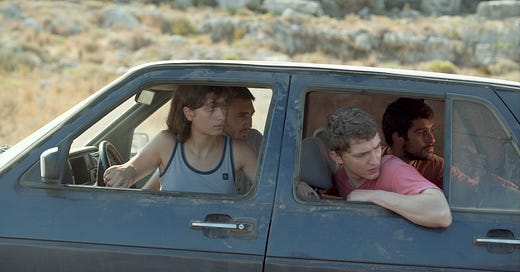Music (Angela Schanelec, 2023)
Incoherence and absence are foundational principles of the work of Angela Schanelec. Her formal maneuvers, which casually dismantle narrative coherence through temporal elision, abrupt changes in setting, and sacred, discrete shot compositions (e.g. she composes conversation against typical shot reverse-shot conventions and loves shots of limbs), simultaneously suggest boundless possibility and overwhelming incomprehensibility.
Her latest, Music, takes grand narratives as its subject. The film is a loose contemporary retelling of the Oedipus myth. We open with a dense fog rolling over verdant Grecian hills. Next, we see a baby abandoned with red wounds on his feet. The baby is adopted, and suddenly, the film has jumped decades into the future. A group of 20-somethings crash their car on a rocky beach. One of them, Ion, has the same pedal wounds. After a man attempts to kiss them, Ion pushes the man off a cliff.
Music is perhaps the most accessible of Schanelec’s films because as the film progresses, you can attempt to fit onscreen events to mythological archetype. As Ion finds himself in jail, striking up a relationship with one of the prison guards Iro, Music becomes a film about the ways we subconsciously conform to historical narratives. Crucially, Music questions the possibility of facing complexity, freed from narrative crutch. Ion’s wounds, the only indicator that this character is the same as the baby from the film’s second shot, become a steadily increasing burden. Iro teaches Ion how to sing, and the classical music of Bach, Vivaldi, and Pergolesi provides catharsis.
Schanelec’s imagery is typically masterful. While most of her films are set in urban spaces, a majority of Music takes place in the Greek countryside. The openness of these spaces contrasts with the constricting burden of the Oedipal archetype. Unfathomable love is conveyed through the gentle washing of a baby’s feet, or tenderly clasped hands under a sink. Repeated overhead shots of characters lying in wait on a private beach grant the setting a portentous magic. Perhaps the most delightful aspect of Music is Schanelec’s use of animals, a welcome continuation from the framing device of I Was At Home, But…. The small animals in the film, which first seem to echo our trapped characters, gradually assert their own agency, even trying to save our protagonists in the film’s most tragic sequence.
Eventually, Music relocates to Berlin. Decades have passed over the course of the film, even as the actors have remained the same. We don’t really know how old Ion is, but he’s teaching music, and mostly playing kitschy, sentimental songs. Much of the Oedipal narrative has played out in one way or another, and as the subconscious prophecy has begun to resolve, Ion has lost his sense of sight. An unnamed man dies in the street, and the ubiquity of tragedy places the self-importance of Ion’s prophecy into perspective. Music’s final return to the pastoral, set to multiple harmonizing voices for the first time in the film’s nearly 2 hour runtime, is an image of serene hope.
Music is distributed by Cinema Guild and in theaters now.




